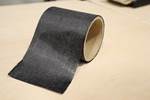Syensqo expands bio-based portfolio with novel MTM epoxy prepreg
Bio-based MTM 49-3 responds to sustainability goals in automotive, containing 30% bio-sourced monomers.
Section of a motor body panel using MTM 49-3. Source | Syensqo
(Brussels, Belgium), previously part of Solvay Group, has developed a new version of its flagship MTM 49-3 resin that contains 30% bio-sourced monomers. The product variant complements the portfolio of the company’s MTM prepregs and targets structural automotive applications, including body panels, chassis components and spoilers.
“Our bio-based MTM 49-3 will help OEMs and Tiers to reduce fossil depletion and meet their carbon neutrality goals, while ensuring the same high levels of quality, processability and mechanical performance as its original counterpart,” states Greg Kelly, head of composite product management at Syensqo.
Just like the incumbent material, Syensqo’s novel bio-based MTM 49-3 has a dry glass transition temperature (Tg) of 190°C, and it exhibits enhanced toughness for high impact resistance versus competitive thermoset prepregs. Thanks to its high strength-to-weight ratio, it is reported to yield component mass savings of up to 40% over metals. The product is compatible with autoclave and press-conversion processes and achieves curing at 135°C within 60 minutes. In addition, it has been designed for operator safety, and is free from carcinogens, mutagens or reproductive toxins.
Related Content
-
Carbon fiber, bionic design achieve peak performance in race-ready production vehicle
Porsche worked with Action Composites to design and manufacture an innovative carbon fiber safety cage option to lightweight one of its series race vehicles, built in a one-shot compression molding process.
-
Welding is not bonding
Discussion of the issues in our understanding of thermoplastic composite welded structures and certification of the latest materials and welding technologies for future airframes.
-
Otto Aviation launches Phantom 3500 business jet with all-composite airframe from Leonardo
Promising 60% less fuel burn and 90% less emissions using SAF, the super-laminar flow design with windowless fuselage will be built using RTM in Florida facility with certification slated for 2030.



